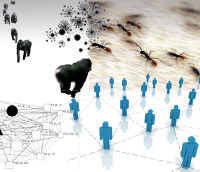Orateur
M.
Marine Battesti
(Laboratoire Évolution, Génomes et Spéciation, CNRS-UPS11)
Description
How social information can spreads and be maintained within a group has been a central question in behavioral ecology. Recent studies have found that Drosophila melanogaster can use social information to select for specific oviposition medium. Naive female flies modify their oviposition medium choice after having interacted with demonstrator flies which have been trained to prefer one specific medium. Here we present the first evidence of genetic variation for social transmission using the well described genetic natural polymorphism on foraging gene. The foraging gene encodes a cGMP-dependent protein kinase (PKG), and natural allelic variation results in the ‘rover’ (forR) and ‘sitter’ (fors) behavioral variants that differ in PKG activity levels. We performed a series of social transmission experiments and show that, if rover flies can acquire information trained rovers or trained sitters without discrimination, naive sitters are selective on the choice of the source of information and only acquire information from trained sitters. We present evidence of a role of the cuticular hydrocarbon profile produced by the flies on social transmission. Our results provide perspectives on the study of the genetic and socio-environmental factors affecting social transmission with the integration of experimental approach, social network analysis and modeling.
Auteur
M.
Marine Battesti
(Laboratoire Évolution, Génomes et Spéciation, CNRS-UPS11)
Co-auteurs
Dr
Cristian Pasquaretta
(Institut Pluridisciplinaire Hubert Curien)
Dr
Cédric Sueur
(Institut Pluridisciplinaire Hubert Curien)
Dr
Céline Moreno
(Laboratoire Évolution, Génomes et Spéciation, CNRS-UPS11)
Dr
Dominique Joly
(Laboratoire Évolution, Génomes et Spéciation, CNRS-UPS11)
Dr
Frédéric Méry
(Laboratoire Évolution, Génomes et Spéciation, CNRS-UPS11)

